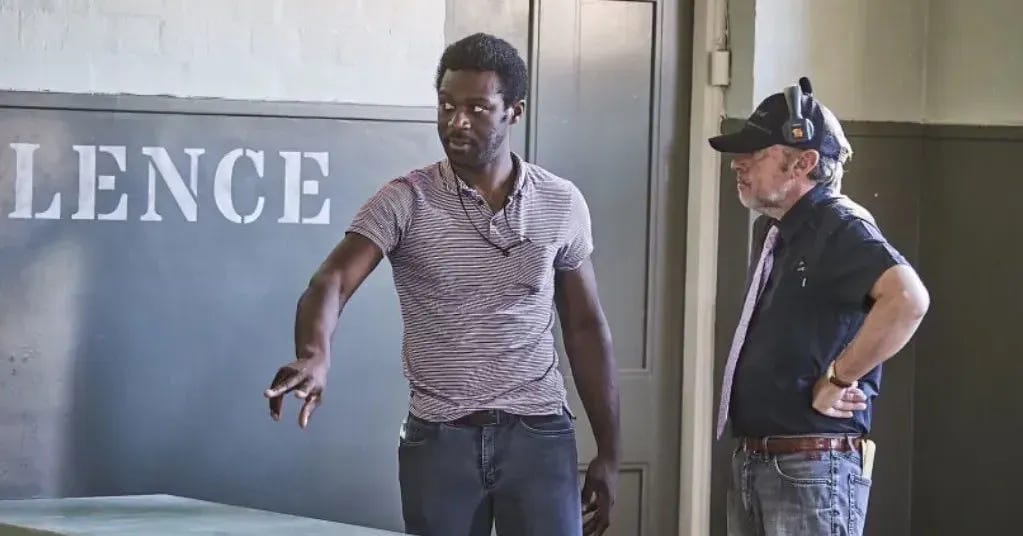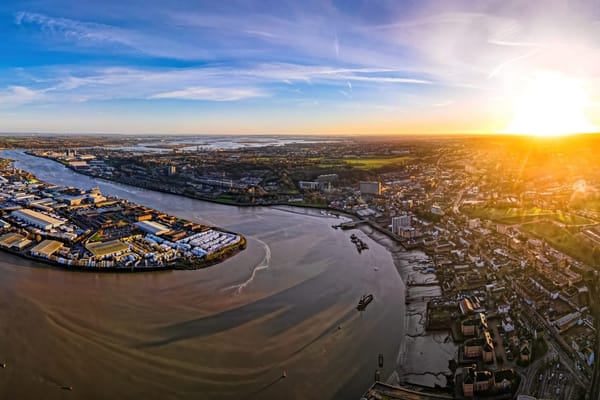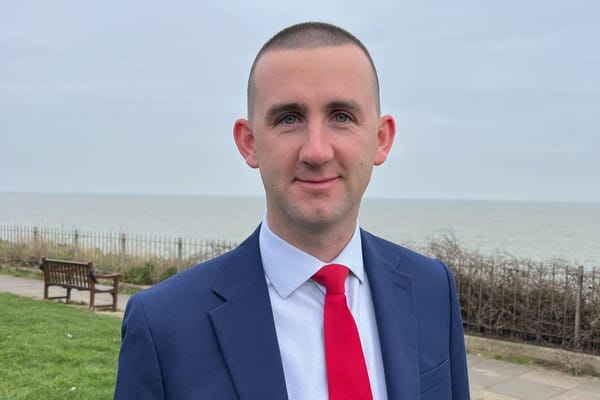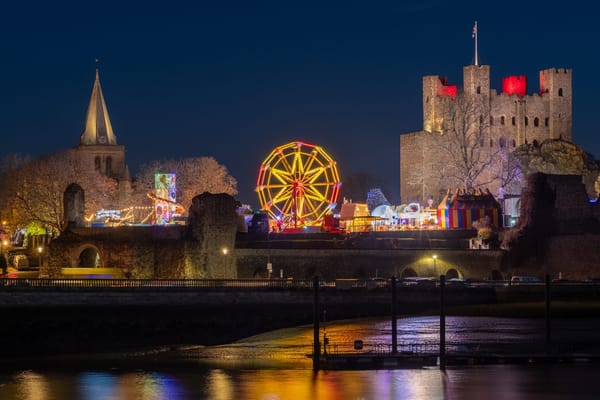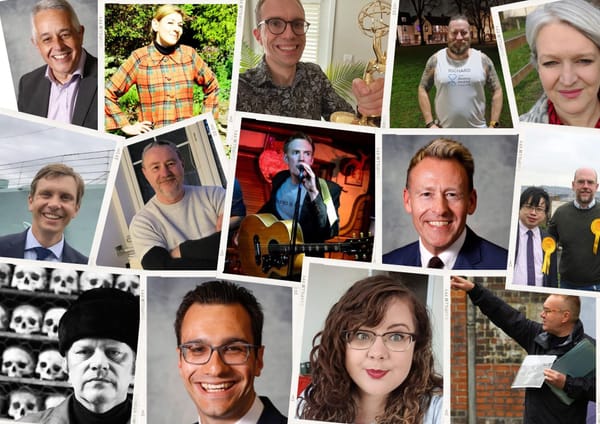“They are movies that will at some point get made"
What Steven asked Francis Annan, screenwriter and director of Escape of Pretoria.
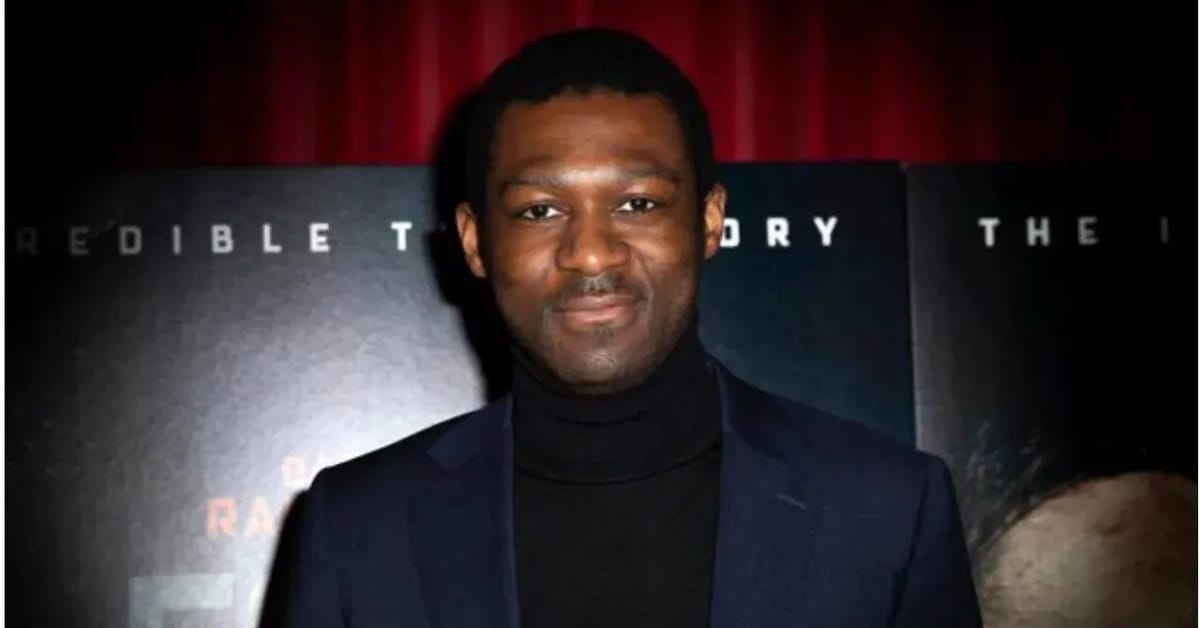
Earlier this year, we spoke to director and Medway resident Francis Annan about his film Escape to Pretoria when it became available on Netflix. We wanted to go deeper, so Steven sat down with him in the Mast and Rigging pub in Gillingham to talk about what brought him to Medway, his family connection to Ghana, the question that almost caused an existential crisis, and what a film about Medway would look like.

What is your official occupation?
Screenwriter and film director.
Do you have a preference of those two disciplines?
There are three things. There are writers, there are directors and there are writer-directors. They're three different things. I would not consider myself a writer-director. I consider myself first and foremost a director and a writer, a separate discipline. I often do tend to fall into the writer-director category. Now a writer writes scripts, then hands it over to a producer and director and they go and do it. A director typically is hired to direct the scripts. They might not have previously had any association with or they've been attached to direct it early on, but it's not been written yet. I've got several projects like that. Writer-directors are people who have their own original ideas from inception like Christopher Nolan. He isn't a director of people's scripts, he directs his own. They only pretty much exclusively work on things they've written in terms of directing. I often fall into that category, but I see myself as a director. My utopia would be to be sent scripts and to read them and then say you could do this, you could do that, and then bring them to life. The French name for director is realisateur, ‘the realiser.’ I think that's a good technical definition. I write, but really, I see myself as a director, and I have writer-directed, if that makes sense.
We spoke previously about Escape to Pretoria. Is there any other work that people may have seen, or they can check out?
I did a very low budget feature length. I’ve done some TV and I’ve done a few shorts. When you're doing all of that, you're taking a few colours that someone's thrown on the table and going, ‘Oh, I can do this.’ You're partly making a lot of mistakes. Tarantino made a first movie and it was a complete mess, but he made all his mistakes and learned everything he needed to make Reservoir Dogs after this first movie. I can empathise with that. The feature-length movie I made, it was like a Lars von Trier-esque, Dogville, Manderlay sort of thing. We built sets, but then the fourth wall didn't exist. We did a scene in the tavern, we had tables and lamps, but it was black. There was one door in the middle. We tried to abstract it. That was because of no money. Also, because it was supposed to be this illusory dream-like transition between real life and a strange place, ‘What's going on?’ We leant into the art and the expression of it. I learned a lot about what works, about what doesn't. I shot a scene that didn't really work, but then I jump cut it and it gave it this real energy. ‘Right, jump cuts, temporal time, I can play with time.’ I was cutting my teeth, making those movies. The main theatrical movie was Escape From Pretoria.
At the risk of sounding like your mother-in-law, can you make a living out of this?
Yes and no. It's a bit like being an actor or being a musician, an artist, painter. The thing is the thing, the artistic discipline is what it is. One's ability to be successful and make money out of it is almost, it's a very important question, but it's almost separate from it. Some of the best artists in the world may well be a 70-year-old woman living in a council flat down the road. She's an amazing artist, but she does it for the love of it. It's only either when she passes or when someone finds her stuff that you go, ‘Oh my gosh, I've got all this amazing stuff.’ The same with filmmaking. It's this weird synthesis of creative and artistic pursuit on one hand and the need to make money to live. I have been able to, but it is hard because the monetary value and the monetary element of it is externally derived. If you get a job, you can apply for a job, can eventually do the interview and you get that job and, redundancies and economic situations notwithstanding, you've got that job. You either leave it or resign or whatever. That's not how films are. Films are essentially contracts. You're working on a very contract basis. You're not working until you are on a movie. When you're on a movie, life is great, you're getting paid, and then the day that that movie's over, you're not getting paid. You're not staff, you're not salaried. And in order to get a movie greenlit, there's so many things that out of your control, that you're very much reliant upon other factors. A studio boss saying ‘Yes,’ money coming together, an actor or actress saying, ‘I want to work with you.’
What have you been doing for income since you finished Escape from Pretoria?
Because I write, I've been able to write as a source of income.
Is this writing films for yourself or is this writing for other people?
Well at the moment it's been for myself. I've been courted to write for others. Sometimes I've not got the gig, or I've been too busy, other times it's worked out so there's that. Also, sometimes in order to keep a director engaged with project they might offer you a retainer where they might say, ‘If this project goes ahead and as it begins to move, we can give you this and give you that.’ That can help. On one project, I was flown out to LA to do research on a project, and paid a bit for that. You have these sorts of things, but when you're getting paid is when you're in a movie. Between the pandemic, the following year after Escape and various other turmoil in the industry, the 2023 writer’s strike and then the actor’s strike and then we've had various tectonic plates, with streamers and streaming decline, that's made it quite difficult for a lot of filmmakers to be able to get projects off the ground.
When you look at current world events, you think ‘How important is this?’ But it is a medium that has, not only entertainment value, but a great ability to reach into people's homes and people's hearts and tell them about a world that they otherwise would not be able to access or haven't heard of or would never seek to investigate on their own. You watch a movie about Vietnam, or you watch a movie about a struggling artist or what it means to be the Prime Minister of a country, these open our minds. The money and the projects and getting the gig aside, when you actually film, I have an opportunity to tell the story. It does motivate you for many years.
With directing, what is pleasure that comes to mind, and what is a challenge?
One is when you read a script, read a scene from the script, either that you've written yourself or someone else has written, and you envision it. You can see the scene playing out almost in your mind, visually. Then you spend all that time raising the money and getting the cast and building the set and eventually you're on the set and you shoot the scene that you dreamt of six months ago, a year ago, two years ago, whatever. That's quite a satisfying moment. I think that act of turning words into images and words into scenes is something that's quite enjoyable. Turning the abstract into the tangible. I do enjoy that. When I'm working with actors and think of a scene a certain way and then they say, ‘No,’ they have brought their perspective. That's quite refreshing when you actually learn something new that you hadn't seen before because an actor or a camera person says, ‘Have you seen this?’ ‘Have you looked at it this way?’ That's quite enjoyable.
The difficulties often in terms of directing on set, it's just time. There's constant feeling that you're against the clock and am I doing it well enough and getting what I need? That's not a nice feeling. You want to have two hours, and you've only got one. You want to do another take, and you've got to move on. You feel like you're stabbing in the dark and you're not sure if you've quite got it. Then you go to the edit and cry, and figure it out.
